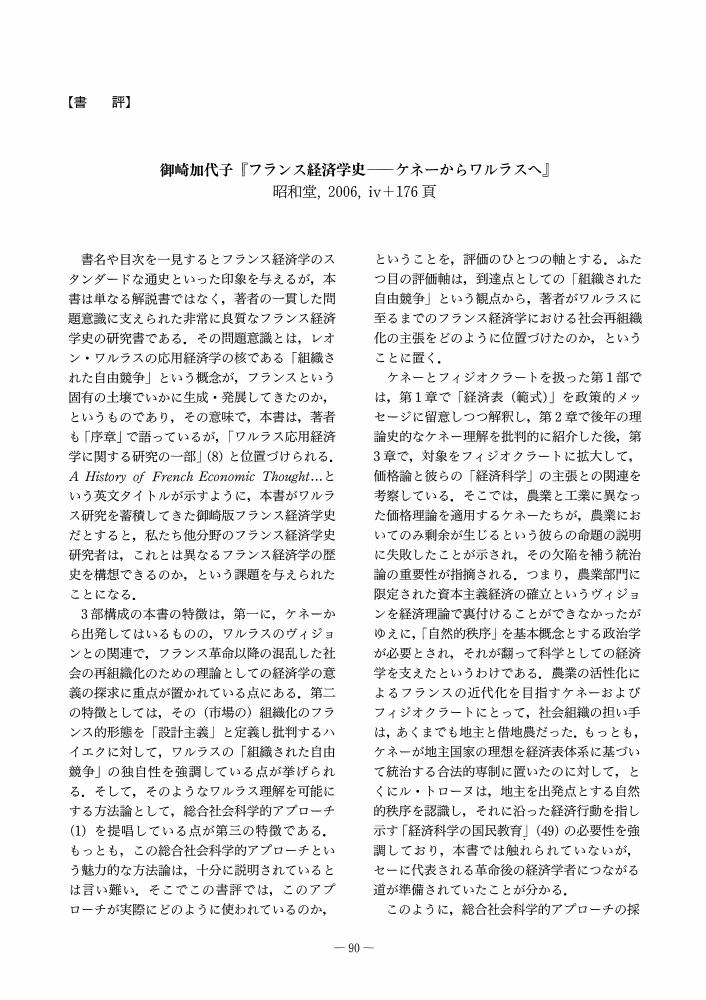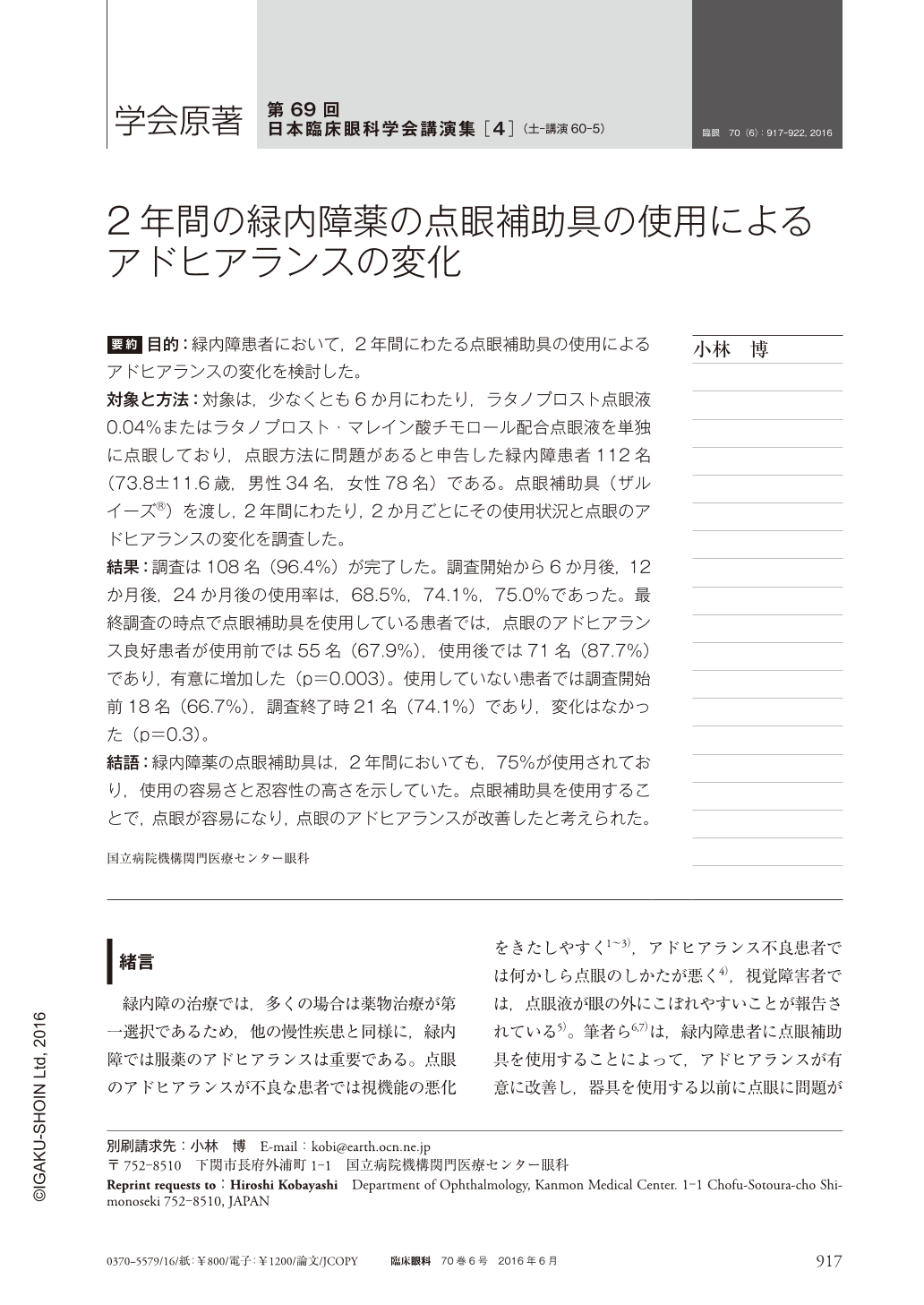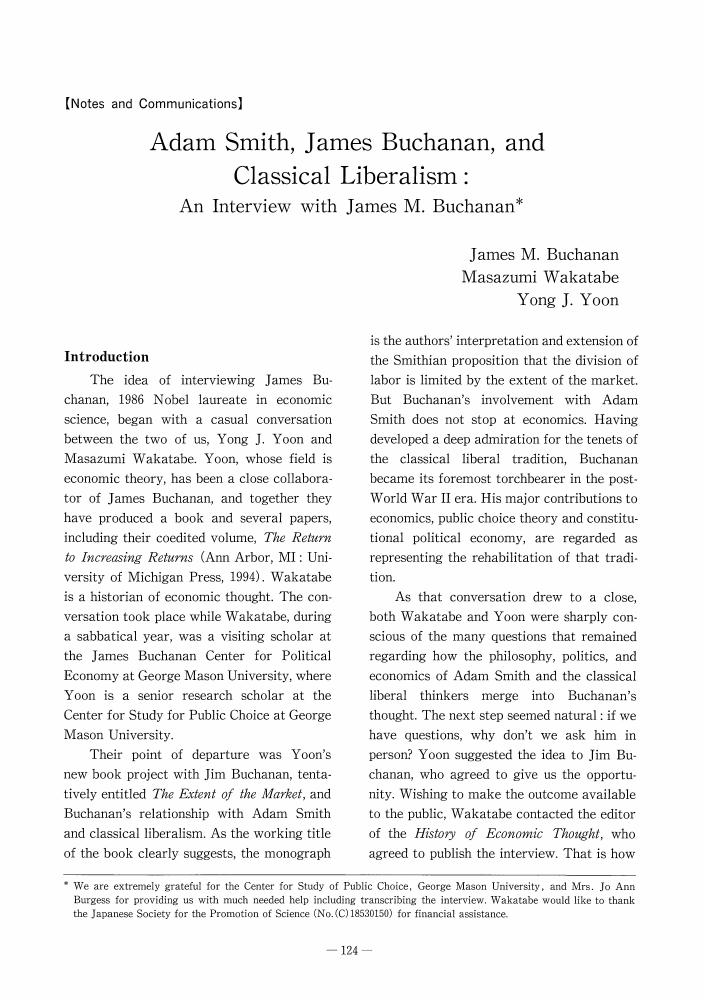- 著者
- 大島 幸治 佐藤 有史
- 出版者
- 経済学史学会
- 雑誌
- 経済学史研究 (ISSN:18803164)
- 巻号頁・発行日
- vol.52, no.1, pp.67-83, 2010 (Released:2019-08-20)
- 著者
- 壽里 竜
- 出版者
- The Japanease Society for the History of Economic Thought
- 雑誌
- 経済学史研究 (ISSN:18803164)
- 巻号頁・発行日
- vol.50, no.2, pp.101-102, 2009-02-05 (Released:2010-08-05)
2 0 0 0 OA ウィリアム・カップの科学統合論と実質的合理性
- 著者
- 山根 卓二
- 出版者
- The Japanease Society for the History of Economic Thought
- 雑誌
- 経済学史研究 (ISSN:18803164)
- 巻号頁・発行日
- vol.50, no.2, pp.21-37, 2009-02-05 (Released:2010-08-05)
- 参考文献数
- 54
By exploring a theory of human sciences that is the basis of Karl William Kapp's concept of institutional economics, this paper aims to clarify the originality of his social cost theory. The difference between the so-called external dis-economy theory, which is part of mainstream economics, and Kapp's social cost theory is a disagreement about rationality. The former assumes that entrepreneurial behavior to maximize profit is simply rational. Therefore, the cause of social loss, such as environmental disruption is not attributed to the entrepreneurial behavior per se, but is attributed to externalities called “exceptional cases.”On the other hand, in Kapp's social cost theory, irrational human actors are assumed. Kapp, who lived through Nazi oppression, and who was inspired by the methodology of psychologist Erich Fromm, sought to explain human irrationality by people's self-deceptive behaviors. In the background of conscious corporate desire for money and profit are the wholly unconscious human needs for stability, continuity, power, and social approval. And the fulfillment of these needs might be pursued even at the price of one's existence or well-being. For Kapp, social cost is a socio-pathological phenomenon generated collectively by enterprisers who, in their conscious minds, firmly believe themselves to be “sane.” While mainstream economics might define rationality solely from the perspective of monetary desire, Kapp takes unconscious needs into consideration as well as conscious needs, and seeks to define rationality within a comprehensive structure of human need, including biological and cultural needs. This is what is called substantive rationality. In order to develop this standard, Kapp's theory had to integrate economics with other social sciences, and even with the natural sciences.
- 著者
- 有江 大介
- 出版者
- 経済学史学会
- 雑誌
- 経済学史研究 (ISSN:18803164)
- 巻号頁・発行日
- vol.50, no.1, pp.113-114, 2008-07-31 (Released:2010-08-05)
2 0 0 0 OA 御崎加代子『フランス経済学史―ケネーからワルラスヘ』昭和堂, 2006, iv+176頁
- 著者
- 栗田 啓子
- 出版者
- 経済学史学会
- 雑誌
- 経済学史研究 (ISSN:18803164)
- 巻号頁・発行日
- vol.49, no.2, pp.90-91, 2007-12-25 (Released:2010-08-05)
2 0 0 0 OA 点眼補助器具の使用性に関する検討
- 著者
- 村上 雅裕 三浦 友里 桂木 聡子 大野 雅子 天野 学 森山 雅弘
- 出版者
- Japanese Society of Drug Informatics
- 雑誌
- 医薬品情報学 (ISSN:13451464)
- 巻号頁・発行日
- vol.17, no.3, pp.140-144, 2015 (Released:2015-12-18)
- 参考文献数
- 5
Objective: For pharmacists to select a suitable auxiliary device for eye drop administration for patients who have difficulty in applying eye drops, the pharmacists need to know the characteristics and level of difficulty of using each device.Methods: Thus, we compared the characteristics of New Rakuraku Tengan, Rakuraku Tengan III, and an eye-drop self-help device and also conducted a survey involving 40 healthy volunteers on each device’s accessibility and suitability for people with motor disabilities.Results: New Rakuraku Tengan received the highest score for “usage was able to easily understand” (70.0% of the respondents answered positively) and “suitability for poor-sighted people” (65.0%). Rakuraku Tengan III received the highest score for the “effectiveness of photos and illustrations in the manual” (77.5%), but was evaluated to be difficult to use. The eye-drop self-help device received the highest score for “suitability for people with difficulty raising their shoulders and arms” (75.0%).Results: Thus, we observed the need for pharmacists to have thorough knowledge of the products in order to recommend suitable auxiliary devices for eye drop administration for each patient.
2 0 0 0 2年間の緑内障薬の点眼補助具の使用によるアドヒアランスの変化
要約 目的:緑内障患者において,2年間にわたる点眼補助具の使用によるアドヒアランスの変化を検討した。 対象と方法:対象は,少なくとも6か月にわたり,ラタノプロスト点眼液0.04%またはラタノプロスト・マレイン酸チモロール配合点眼液を単独に点眼しており,点眼方法に問題があると申告した緑内障患者112名(73.8±11.6歳,男性34名,女性78名)である。点眼補助具(ザルイーズ®)を渡し,2年間にわたり,2か月ごとにその使用状況と点眼のアドヒアランスの変化を調査した。 結果:調査は108名(96.4%)が完了した。調査開始から6か月後,12か月後,24か月後の使用率は,68.5%,74.1%,75.0%であった。最終調査の時点で点眼補助具を使用している患者では,点眼のアドヒアランス良好患者が使用前では55名(67.9%),使用後では71名(87.7%)であり,有意に増加した(p=0.003)。使用していない患者では調査開始前18名(66.7%),調査終了時21名(74.1%)であり,変化はなかった(p=0.3)。 結語:緑内障薬の点眼補助具は,2年間においても,75%が使用されており,使用の容易さと忍容性の高さを示していた。点眼補助具を使用することで,点眼が容易になり,点眼のアドヒアランスが改善したと考えられた。
2 0 0 0 OA 特定妊婦って何?(研修会,<特集>第44回日本女性心身医学会学術集会報告)
- 著者
- 光田 信明
- 出版者
- 一般社団法人 日本女性心身医学会
- 雑誌
- 女性心身医学 (ISSN:13452894)
- 巻号頁・発行日
- vol.20, no.3, pp.289-293, 2016-03-31 (Released:2017-01-26)
2 0 0 0 OA 森嶋通夫『森嶋通夫著作集』全14巻+別巻岩波書店, 2004-2006
- 著者
- 浅田 統一郎
- 出版者
- 経済学史学会
- 雑誌
- 経済学史研究 (ISSN:18803164)
- 巻号頁・発行日
- vol.49, no.1, pp.172-173, 2007-06-30 (Released:2010-08-05)
2 0 0 0 OA Ordoliberalism and the Social Market Economy
- 著者
- Keith Tribe
- 出版者
- The Japanease Society for the History of Economic Thought
- 雑誌
- 経済学史研究 (ISSN:18803164)
- 巻号頁・発行日
- vol.49, no.1, pp.155-160, 2007-06-30 (Released:2010-08-05)
- 参考文献数
- 6
The modern market economy which we seek to build should have a decidedly social constitution. Its social character is based primarily on the fact that it is able to offer a greater and more varied quantity of goods at prices determined by the demands of the consumer, the resulting low prices raising the real value of wages and thereby permitting a greater and more extensive satisfaction of human needs.
- 著者
- 村上 俊介
- 出版者
- 経済学史学会
- 雑誌
- 経済学史学会年報 (ISSN:04534786)
- 巻号頁・発行日
- vol.34, no.34, pp.169-170, 1996 (Released:2010-08-05)
- 著者
- 太田 仁樹
- 出版者
- 経済学史学会
- 雑誌
- 経済学史学会年報 (ISSN:04534786)
- 巻号頁・発行日
- vol.41, no.41, pp.102-103, 2002 (Released:2010-08-05)
- 著者
- 住谷 一彦
- 出版者
- 経済学史学会
- 雑誌
- 経済学史学会年報 (ISSN:04534786)
- 巻号頁・発行日
- vol.46, no.46, pp.108-110, 2004 (Released:2010-08-05)
- 著者
- 中山 智香子
- 出版者
- 経済学史学会
- 雑誌
- 経済学史研究 (ISSN:18803164)
- 巻号頁・発行日
- vol.48, no.1, pp.149-151, 2006-06-30 (Released:2010-08-05)
- 著者
- James M. Buchanan Masazumi Wakatabe Yong J. Yoon
- 出版者
- The Japanease Society for the History of Economic Thought
- 雑誌
- 経済学史研究 (ISSN:18803164)
- 巻号頁・発行日
- vol.48, no.1, pp.124-138, 2006-06-30 (Released:2010-08-05)
2 0 0 0 OA シジウィック『経済学原理』におけるサイエンスとアート
- 著者
- 中井 大介
- 出版者
- The Japanease Society for the History of Economic Thought
- 雑誌
- 経済学史研究 (ISSN:18803164)
- 巻号頁・発行日
- vol.48, no.1, pp.46-62, 2006-06-30 (Released:2010-08-05)
- 参考文献数
- 37
While Henry Sidgwick may be best known as a moral philosopher and the author of The Methods of Ethics (1874), he made notable contributions spanning economics and other fields as well, one of them being The Principles of Political Economy (1883). Even now The Methods and its treatment of utilitarianism is recognized as an authoritative model for ethical theory, but his conclusion that there is a “dualism of practical reason” has generated a great deal of controversy. The relationship between these two works has not yet been fully analyzed in the scholarly and critical literature. In this paper I demonstrate that the structure of the argument in The Principles is closely related to The Methods.Sidgwick distinguishes economics as a Science (what is) from economics as an Art (what ought to be) based on two moral principles, egoism and utilitarianism, both explicated in The Methods. Sidgwick's Science/Art distinction is instantiated by his distinction between “economic man” and “ordinary man.” Economic man is an abstraction signifying economic behavior based on self-interest. In Sidgwick's argument, Science can employ the idea of economic man to objectively analyze a society where self-interested economic behavior is the norm. Ordinary man, on the other hand, is the ideal of economic behavior motivated by moral rules based on both self-interest and utilitarianism. Art defines those governmental activities desired in a society consisting of “ordinary men.”Self-interested economic activity does not necessarily achieve the preferred results. When it leads to monopoly, for example, it works to reduce social production. The dilemma of Sidgwick's “dualism of practical reason” is the generation of conflict between the outcome of economic man's behavior and the desired results of behavior by ordinary man. As I attempt to show here, in The Principles Sidgwick constructed a role for government that would resolve that problem. Furthermore, using the distinction between Science and Art, and introducing egoism and utilitarianism, Sidgwick tried to resuscitate the ideas of the classical school of political economy.
2 0 0 0 OA マルクス研究の現在
- 著者
- 植村 邦彦
- 出版者
- The Japanese Society for the History of Economic Thought
- 雑誌
- 経済学史学会年報 (ISSN:04534786)
- 巻号頁・発行日
- vol.45, no.45, pp.66-77, 2004 (Released:2010-08-05)
- 参考文献数
- 48
In 1998, the one-hundred-and-fiftieth anniversary of the publication of the Communist Manifesto was celebrated in many “developed” countries. An international conference was held in Paris in May, several new editions of the Communist Manifesto were published, and many journals published special issues. Since then, various Marx readers, and several Marx dictionaries and many books on Marx have been published. Marx-studies seem to be renewed.Readings of Marx change with changing historical and political contexts. The collapse of the Soviet Union and the “actually existing socialism” has already had profound consequences in the world of ideas and in global politics. Many authors discuss Marx “after the fall of communism, ” “for a post-acommunist era, ” or “après les marxismes.” Marx is no longer necessarily the theorist of proletarian revolution. Rather he is now widely considered as a democrat against liberalism, or as the premier critical theorist of capitalist society.One of the focuses in contemporary Marx-studies is the relation between Hegel and Marx. While Althusserian Marxists and “Postmodernists” reject Hegelian inheritance in Marx, Hegelian Marxists insist the continuity between Hegel and Marx. While the former argues that Marx criticized Hegelian liberalism, the latter insists that Hegel was democratic as well as Marx. They, however, agree with each other that Marx was a democrat.Another focus is Marx's approach to ecology. While some argue that Marx was in favor of the human domination of nature, others insist that Marx's approach to nature, especially his concept of the metabolism between nature and society, provides original and useful insights into the environmental crisis under capitalism. Capitalism exploits not only human nature as labor power, but also nature itself as resources. As opposed to some ecologists' critiques, Marx aimed to abolish the alienation of labor and nature entirely. Red and Green can still go together.There have always been multiple Marxes, and each one is a product of a reading strategy. As there were multiple Marxes, so there were multiple debates. Re-reading and re-assessing Marx is itself an important way of thinking and doing, but is also a way of reconstructing a Marx at the same time. So we may not forget, as Terrell Carver says, that Marx is plural for us because our problems are plural.
- 著者
- 杉原 四郎
- 出版者
- 経済学史学会
- 雑誌
- 経済学史学会年報 (ISSN:04534786)
- 巻号頁・発行日
- vol.43, no.43, pp.114-115, 2003 (Released:2010-08-05)
2 0 0 0 OA 日本経済思想史: 江戸から明治へ
- 著者
- 小室 正紀
- 出版者
- The Japanese Society for the History of Economic Thought
- 雑誌
- 経済学史学会年報 (ISSN:04534786)
- 巻号頁・発行日
- vol.43, no.43, pp.68-86, 2003 (Released:2010-08-05)
- 参考文献数
- 106
This paper surveys mainly the monograph literature regarding Tokugawa economic thought. Considering what the scholars intend to find through their studies, the present article divides the field into four main groups:(i) A view based on the stage theory of development or the concept of European economic thought. In this category are included two kinds of works which attach much importance to the stage theory based on Western economic development. A group of scholars comment on the backwardness of Tokugawa economic thought as compared with the Western economic thought which was imported after the Meiji restoration. Another group tries to analyse Tokugawa economic thought in terms of such European concepts as mercantilism or physiocracy. Recently, the scholars of this category make use of their theories more flexibly than previously, as a tool to grasp the character of Tokugawa traditions.(ii) A view regarding Tokugawa period as the cradle of Japanese economic growth. The scholars of this category consider that the relatively smooth process of Japanese industrialization was prepared in Tokugawa period. These scholars therefore examine the development of knowledge and thought adequate to the burgeoning market economy of that period. Though they provide some valuable analytical insights into Tokugawa economic thought, some of them might describe the ideas of that period as a too modernised aspect.(iii) A view evaluating Confucian economic thought and a view influenced by the post-modern theories. Some scholars in this category think the modern economic society is reaching its limit and evaluate the harmony between economy and morality in Tokugawa Confucianism. Also represented in this category is work inspired by postmodern theory. This kind of study tries to understand the structure or network of miscellaneous discourses, excluding the modern prejudices. Surely this approach shows the world of the thoughts in a certain period realistically, but it should also consider how to regard the world of this period within the context of chronological history.(iv) An attempt to discover the traditions of economic thought by non-professional thinkers. The scholars of this category find much meaning among the economic thought produced by such non-professional thinkers as samurai-bureaucrats, village masters, intelligent merchants, and so on. These scholars evaluate such non-professional thoughts as having a character of their own, finding new materials concerning this kind of subject. However, most of these attempts have not yet been able to connect such thoughts with the whole body of Tokugawa economic thought.The major publications of each of these categories are critically introduced. The general conclusion is as follows. The divisions that have so characterized the field will be perpetuated in some form. But there is a sense that the very virulent and sterile phase of controversy is spent. Though marked by wide differences in approach and broad diversification of subjects, this field of study is maturing, and the described categories are going to stimulate constructively to one another.
2 0 0 0 OA 進化経済学
- 著者
- 井上 義朗
- 出版者
- The Japanese Society for the History of Economic Thought
- 雑誌
- 経済学史学会年報 (ISSN:04534786)
- 巻号頁・発行日
- vol.42, no.42, pp.95-105, 2002 (Released:2010-08-05)
- 参考文献数
- 58
The purpose of this paper is to provide a brief survey of the recent development of Evolutionary Economics. This paper addresses four representative approaches of Evolutionary Economics—Neo-Austrians, Neo-Schumpeterians, Modern Institutionalism, and Structural Dynamics—and investigates their recent theoretical progress and policy implications.The essential points are as follows: Neo-Austrians have gradually tended to shift their central concern from the market process theory to the cognitive or knowledge structure of the subject. It seems that their aim is to deepen the bounded rationality or the conception of subjectivity through the assistance of adjacent disciplines. It is not evident whether this tendency actually produces a new foundation for the alternative market theory. However, judging from the common interests with a faction of the Neo-Schumpeterians which introduces Genetic Programming, it is likely that this will become one of the more popular research programs of Evolutionary Economics.Neo-Schumpeterians seem to have diverged in recent years. Therefore, this paper focuses on the development of replicator dynamics. However, it is also argued that replicator dynamics points out some faults of a newly fashioned laissez-faire principle which seems to be based on Evolutionary Economics. Replicator dynamics turns our attention to the contradictory relationship between innovation and market mechanism through a new perspective on the role of ‘variety.’Modern Institutionalism has two types of cumulative causation; the one is theoretical and policy intended, and the other is methodological and philosophical. This paper indicates the recent shift from the former to the latter in Modern Institutionalisms' concerns.Lastly, it is argued that Structural Dynamics seems to have revived some policy implications of Pasinetti's original model. The policy implication of that model was to apply the growth of productivity to the reduction of input materials including working time, not to increase of amount of goods as usual. This paper investigates some attempts to revive such a forgotten theme, and explores their implications for Evolutionary Economic Policy.












